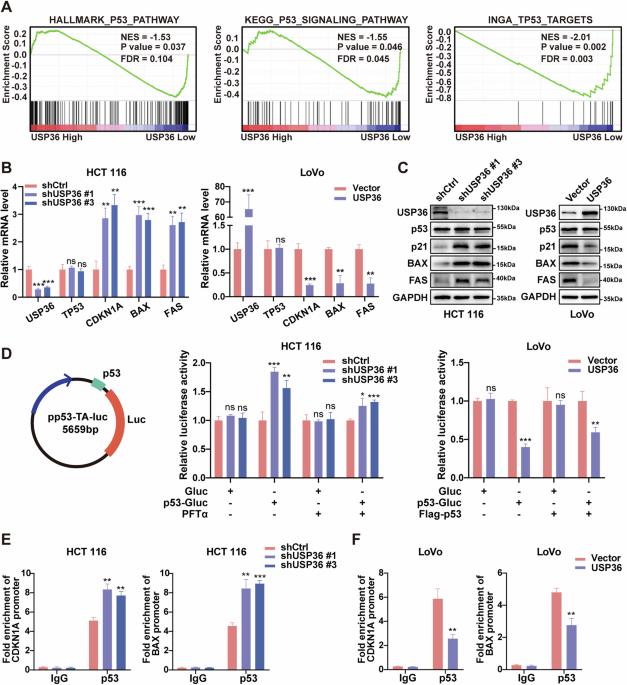USP36 promotes colorectal cancer progression through inhibition of p53 signaling pathway via stabilizing RBM28
IF 6.9
1区 医学
Q1 BIOCHEMISTRY & MOLECULAR BIOLOGY
引用次数: 0
Abstract
Colorectal cancer (CRC) stands as the second most common cause of cancer-related mortality globally and p53, a widely recognized tumor suppressor, contributes to the development of CRC. Ubiquitin-specific protease 36 (USP36), belonging to the deubiquitinating enzyme family, is involved in tumor progression across multiple cancers. However, the underlying molecular mechanism in which USP36 regulates p53 signaling pathway in CRC is unclear. Here, our study revealed that USP36 was increased in CRC tissues and associated with unfavorable prognosis. Functionally, elevated USP36 could promote proliferation, migration, and invasion of CRC cells in vitro and in vivo. Mechanistically, USP36 could interact with and stabilize RBM28 via deubiquitination at K162 residue. Further, upregulated RBM28 could bind with p53 to suppress its transcriptional activity and therefore inactivate p53 signaling pathway. Collectively, our investigation identified the novel USP36/RBM28/p53 axis and its involvement in promoting cell proliferation and metastasis in CRC, which presents a promising therapeutic strategy for CRC treatment.

USP36 通过稳定 RBM28 来抑制 p53 信号通路,从而促进结直肠癌的进展。
结肠直肠癌(CRC)是全球癌症相关死亡率的第二大常见病因,而 p53 作为一种公认的肿瘤抑制因子,对 CRC 的发展起着重要作用。属于去泛素化酶家族的泛素特异性蛋白酶 36(USP36)参与了多种癌症的肿瘤进展。然而,USP36 在 CRC 中调控 p53 信号通路的分子机制尚不清楚。我们的研究发现,USP36 在 CRC 组织中增高,并与不良预后相关。在功能上,USP36 的升高可促进 CRC 细胞在体外和体内的增殖、迁移和侵袭。从机理上讲,USP36可通过在K162残基上去泛素化与RBM28相互作用并使其稳定。此外,上调的 RBM28 可与 p53 结合,抑制其转录活性,从而使 p53 信号通路失活。总之,我们的研究发现了新的 USP36/RBM28/p53 轴及其在促进 CRC 细胞增殖和转移中的参与,这为 CRC 的治疗提供了一种有前景的治疗策略。
本文章由计算机程序翻译,如有差异,请以英文原文为准。
求助全文
约1分钟内获得全文
求助全文
来源期刊

Oncogene
医学-生化与分子生物学
CiteScore
15.30
自引率
1.20%
发文量
404
审稿时长
1 months
期刊介绍:
Oncogene is dedicated to advancing our understanding of cancer processes through the publication of exceptional research. The journal seeks to disseminate work that challenges conventional theories and contributes to establishing new paradigms in the etio-pathogenesis, diagnosis, treatment, or prevention of cancers. Emphasis is placed on research shedding light on processes driving metastatic spread and providing crucial insights into cancer biology beyond existing knowledge.
Areas covered include the cellular and molecular biology of cancer, resistance to cancer therapies, and the development of improved approaches to enhance survival. Oncogene spans the spectrum of cancer biology, from fundamental and theoretical work to translational, applied, and clinical research, including early and late Phase clinical trials, particularly those with biologic and translational endpoints.
 求助内容:
求助内容: 应助结果提醒方式:
应助结果提醒方式:


